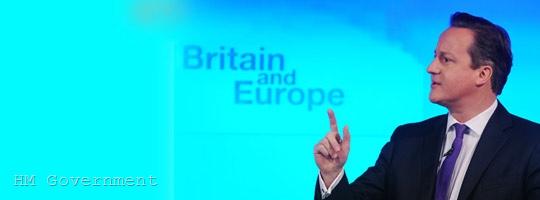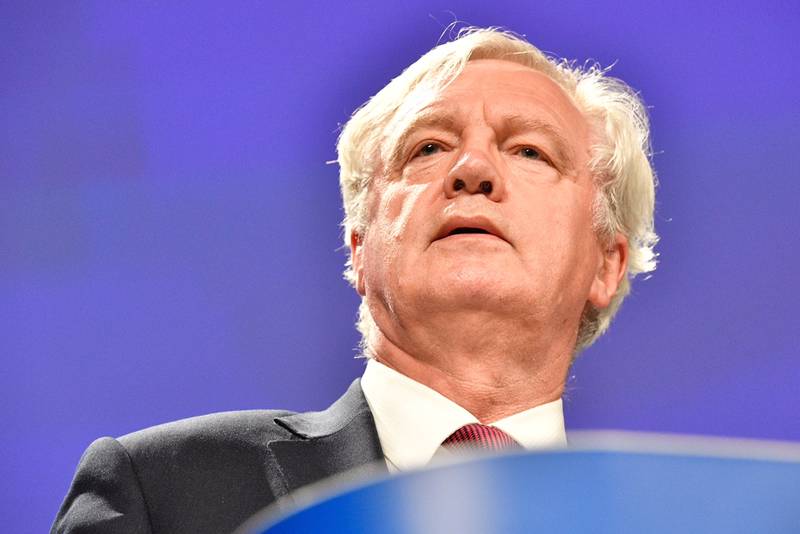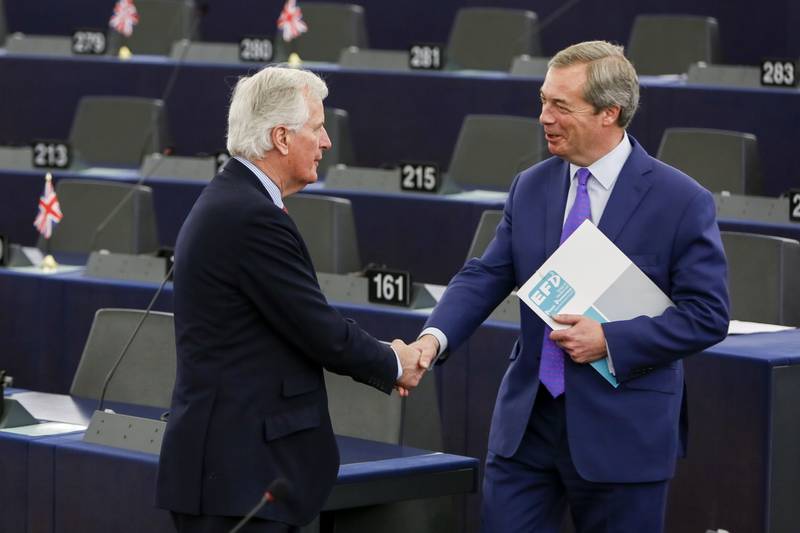Full Text of David Cameron's European Speech
David Cameron*, January 24, 2013
 This morning I want to talk about the future of Europe. But first, let us remember the past.Seventy years ago, Europe was being torn apart by its second catastrophic conflict in a generation. A war which saw the streets of European cities strewn with rubble. The skies of London lit by flames night after night. And millions dead across the world in the battle for peace and liberty.
This morning I want to talk about the future of Europe. But first, let us remember the past.Seventy years ago, Europe was being torn apart by its second catastrophic conflict in a generation. A war which saw the streets of European cities strewn with rubble. The skies of London lit by flames night after night. And millions dead across the world in the battle for peace and liberty.
As we remember their sacrifice, so we should also remember how the shift in Europe from war to sustained peace came about. It did not happen like a change in the weather. It happened because of determined work over generations. A commitment to friendship and a resolve never to re-visit that dark past – a commitment epitomised by the Elysée Treaty signed 50 years ago this week.
After the Berlin Wall came down I visited that city and I will never forget it.The abandoned checkpoints. The sense of excitement about the future. The knowledge that a great continent was coming together. Healing those wounds of our history is the central story of the European Union. What Churchill described as the twin marauders of war and tyranny have been almost entirely banished from our continent. Today, hundreds of millions dwell in freedom, from the Baltic to the Adriatic, from the Western Approaches to the Aegean. And while we must never take this for granted, the first purpose of the European Union – to secure peace – has been achieved and we should pay tribute to all those in the EU, alongside NATO, who made that happen.
But today the main, over-riding purpose of the European Union is different: not to win peace, but to secure prosperity. The challenges come not from within this continent but outside it. From the surging economies in the East and South. Of course a growing world economy benefits us all, but we should be in no doubt that a new global race of nations is underway today. A race for the wealth and jobs of the future. The map of global influence is changing before our eyes. And these changes are already being felt by the entrepreneur in the Netherlands, the worker in Germany, the family in Britain.
So I want to speak to you today with urgency and frankness about the European Union and how it must change – both to deliver prosperity and to retain the support of its peoples. But first, I want to set out the spirit in which I approach these issues. I know that the United Kingdom is sometimes seen as an argumentative and rather strong-minded member of the family of European nations. And it’s true that our geography has shaped our psychology. We have the character of an island nation – independent, forthright, passionate in defence of our sovereignty. We can no more change this British sensibility than we can drain the English Channel.
And because of this sensibility, we come to the European Union with a frame of mind that is more practical than emotional. For us, the European Union is a means to an end – prosperity, stability, the anchor of freedom and democracy both within Europe and beyond her shores – not an end in itself. We insistently ask: How? Why? To what end?
But all this doesn’t make us somehow un-European. The fact is that ours is not just an island story – it is also a continental story. For all our connections to the rest of the world – of which we are rightly proud – we have always been a European power – and we always will be. From Caesar’s legions to the Napoleonic Wars. From the Reformation, the Enlightenment and the Industrial Revolution to the defeat of Nazism. We have helped to write European history, and Europe has helped write ours. Over the years, Britain has made her own, unique contribution to Europe. We have provided a haven to those fleeing tyranny and persecution. And in Europe’s darkest hour, we helped keep the flame of liberty alight. Across the continent, in silent cemeteries, lie the hundreds of thousands of British servicemen who gave their lives for Europe’s freedom.
In more recent decades, we have played our part in tearing down the Iron Curtain and championing the entry into the EU of those countries that lost so many years to Communism. And contained in this history is the crucial point about Britain, our national character, our attitude to Europe. Britain is characterised not just by its independence but, above all, by its openness. We have always been a country that reaches out. That turns its face to the world … That leads the charge in the fight for global trade and against protectionism. This is Britain today, as it’s always been:Independent, yes – but open, too. I never want us to pull up the drawbridge and retreat from the world. I am not a British isolationist.
I don’t just want a better deal for Britain. I want a better deal for Europe too. So I speak as British Prime Minister with a positive vision for the future of the European Union. A future in which Britain wants, and should want, to play a committed and active part. Some might then ask: why raise fundamental questions about the future of Europe when Europe is already in the midst of a deep crisis? Why raise questions about Britain’s role when support in Britain is already so thin. There are always voices saying “don’t ask the difficult questions.
But it’s essential for Europe – and for Britain – that we do because there are three major challenges confronting us today. First, the problems in the Eurozone are driving fundamental change in Europe. Second, there is a crisis of European competitiveness, as other nations across the world soar ahead. And third, there is a gap between the EU and its citizens which has grown dramatically in recent years. And which represents a lack of democratic accountability and consent that is – yes – felt particularly acutely in Britain. If we don’t address these challenges, the danger is that Europe will fail and the British people will drift towards the exit. I do not want that to happen. I want the European Union to be a success. And I want a relationship between Britain and the EU that keeps us in it.
That is why I am here today: To acknowledge the nature of the challenges we face. To set out how I believe the European Union should respond to them. And to explain what I want to achieve for Britain and its place within the European Union. Let me start with the nature of the challenges we face. First, the Eurozone. The future shape of Europe is being forged. There are some serious questions that will define the future of the European Union – and the future of every country within it. The Union is changing to help fix the currency – and that has profound implications for all of us, whether we are in the single currency or not.
Britain is not in the single currency, and we’re not going to be. But we all need the Eurozone to have the right governance and structures to secure a successful currency for the long term. And those of us outside the Eurozone also need certain safeguards to ensure, for example, that our access to the Single Market is not in any way compromised. And it’s right we begin to address these issues now.
Second, while there are some countries within the EU which are doing pretty well. Taken as a whole, Europe’s share of world output is projected to fall by almost a third in the next two decades. This is the competitiveness challenge – and much of our weakness in meeting it is self-inflicted. Complex rules restricting our labour markets are not some naturally occurring phenomenon. Just as excessive regulation is not some external plague that’s been visited on our businesses. These problems have been around too long. And the progress in dealing with them, far too slow.
As Chancellor Merkel has said – if Europe today accounts for just over 7 per cent of the world’s population, produces around 25 per cent of global GDP and has to finance 50 per cent of global social spending, then it’s obvious that it will have to work very hard to maintain its prosperity and way of life.
Third, there is a growing frustration that the EU is seen as something that is done to people rather than acting on their behalf. And this is being intensified by the very solutions required to resolve the economic problems. People are increasingly frustrated that decisions taken further and further away from them mean their living standards are slashed through enforced austerity or their taxes are used to bail out governments on the other side of the continent. We are starting to see this in the demonstrations on the streets of Athens, Madrid and Rome. We are seeing it in the parliaments of Berlin, Helsinki and the Hague. And yes, of course, we are seeing this frustration with the EU very dramatically in Britain.
Europe’s leaders have a duty to hear these concerns. Indeed, we have a duty to act on them. And not just to fix the problems in the Eurozone. For just as in any emergency you should plan for the aftermath as well as dealing with the present crisis so too in the midst of the present challenges we should plan for the future, and what the world will look like when the difficulties in the Eurozone have been overcome. The biggest danger to the European Union comes not from those who advocate change, but from those who denounce new thinking as heresy. In its long history Europe has experience of heretics who turned out to have a point. And my point is this. More of the same will not secure a long-term future for the Eurozone. More of the same will not see the European Union keeping pace with the new powerhouse economies. More of the same will not bring the European Union any closer to its citizens. More of the same will just produce more of the same – less competitiveness, less growth, fewer jobs.
And that will make our countries weaker not stronger. That is why we need fundamental, far-reaching change. So let me set out my vision for a new European Union, fit for the 21st Century. It is built on five principles. The first: competitiveness. At the core of the European Union must be, as it is now, the single market. Britain is at the heart of that Single Market, and must remain so. But when the Single Market remains incomplete in services, energy and digital – the very sectors that are the engines of a modern economy – it is only half the success it could be. It is nonsense that people shopping online in some parts of Europe are unable to access the best deals because of where they live. I want completing the single market to be our driving mission.
I want us to be at the forefront of transformative trade deals with the US, Japan and India as part of the drive towards global free trade. And I want us to be pushing to exempt Europe’s smallest entrepreneurial companies from more EU Directives. These should be the tasks that get European officials up in the morning – and keep them working late into the night. And so we urgently need to address the sclerotic, ineffective decision making that is holding us back. That means creating a leaner, less bureaucratic Union, relentlessly focused on helping its member countries to compete.
In a global race, can we really justify the huge number of expensive peripheral European institutions? Can we justify a Commission that gets ever larger? Can we carry on with an organisation that has a multi-billion pound budget but not enough focus on controlling spending and shutting down programmes that haven’t worked? And I would ask: when the competitiveness of the Single Market is so important, why is there an environment council, a transport council, an education council but not a single market council?
The second principle should be flexibility. We need a structure that can accommodate the diversity of its members – North, South, East, West, large, small, old and new. Some of whom are contemplating much closer economic and political integration. And many others, including Britain, who would never embrace that goal. I accept, of course, that for the single market to function we need a common set of rules and a way of enforcing them. But we also need to be able to respond quickly to the latest developments and trends.
Competitiveness demands flexibility, choice and openness – or Europe will fetch up in a no-man’s land between the rising economies of Asia and market-driven North America. The EU must be able to act with the speed and flexibility of a network, not the cumbersome rigidity of a bloc. We must not be weighed down by an insistence on a one size fits all approach which implies that all countries want the same level of integration. The fact is that they don’t and we shouldn’t assert that they do. Some will claim that this offends a central tenet of the EU’s founding philosophy. I say it merely reflects the reality of the European Union today. 17 members are part of the Eurozone. 10 are not. 26 European countries are members of Schengen – including four outside the European Union – Switzerland, Norway, Liechtenstein and Iceland. 2 EU countries – Britain and Ireland – have retained their border controls.
Some members, like Britain and France, are ready, willing and able to take action in Libya or Mali. Others are uncomfortable with the use of military force. Let’s welcome that diversity, instead of trying to snuff it out. Let’s stop all this talk of two-speed Europe, of fast lanes and slow lanes, of countries missing trains and buses, and consign the whole weary caravan of metaphors to a permanent siding. Instead, let’s start from this proposition: we are a family of democratic nations, all members of one European Union, whose essential foundation is the single market rather than the single currency. Those of us outside the euro recognise that those in it are likely to need to make some big institutional changes.
By the same token, the members of the Eurozone should accept that we, and indeed all Member States, will have changes that we need to safeguard our interests and strengthen democratic legitimacy. And we should be able to make these changes too. Some say this will unravel the principle of the EU – and that you can’t pick and choose on the basis of what your nation needs. But far from unravelling the EU, this will in fact bind its Members more closely because such flexible, willing cooperation is a much stronger glue than compulsion from the centre.
You can continue reading the entire text here.
*This is the speech David Cameron delivered on January 23rd 2013 on his vision about the future relations of Britain with the EU. A commentary on that speech you can read here.
 Federica Mogherini | © Council of the EU
Federica Mogherini | © Council of the EU | © Council of the EU
| © Council of the EU Luis De Guindos | © Council of the EU
Luis De Guindos | © Council of the EU David Davis | © European Commission
David Davis | © European Commission Angela Merkel | © Council of the EU
Angela Merkel | © Council of the EU Michel Barnier, Nigel Farage | © European Parliament
Michel Barnier, Nigel Farage | © European Parliament